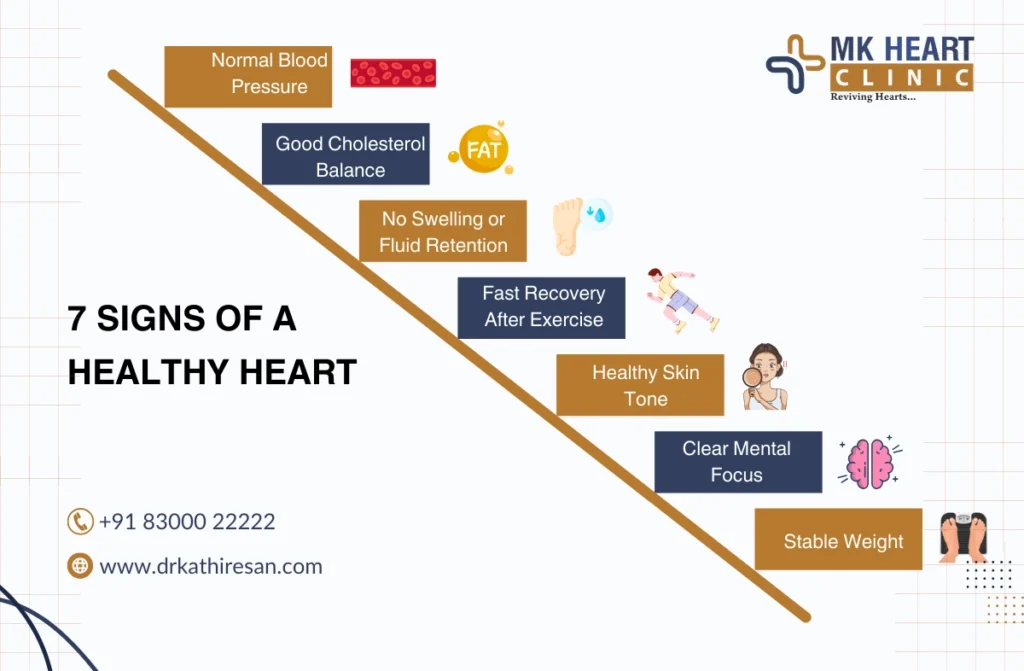The signs of a healthy heart are vital markers of overall health. Your heart works relentlessly to ensure blood circulates throughout your body, delivering oxygen and nutrients while removing waste. But how do you truly know if your heart is healthy? Recognizing these signs is the key to proactive health management.
In this blog, I, Dr. M. Kathiresan, will guide you through the signs of a healthy heart, the symptoms of potential problems, and ways to maintain optimal heart health. By understanding these critical indicators, you can ensure your heart remains in its best condition.

What Are the Signs of a Healthy Heart?
Have you ever wondered, what are the signs of a healthy heart? Your heart doesn’t always make its health obvious, but there are several clear indicators that it’s working well. Here’s what to look for:
- Efficient Resting Heart Rate: A resting heart rate between 60 and 100 beats per minute is an excellent sign. It indicates that your heart is pumping blood efficiently.
- Clear Breathing: If you can breathe deeply and evenly without any shortness of breath, it’s a sign your heart is supplying your lungs and body with adequate oxygen.
- Good Energy Levels: Feeling active and energetic throughout the day means your heart is delivering blood and oxygen effectively.
Understanding what are the signs of a healthy heart empowers you to make informed decisions about your lifestyle and overall health. At the same time, recognizing the Symptoms of Heart Attack is crucial for early intervention and prevention of serious complications.
7 Signs of a Healthy Heart
Here are the 7 signs of a healthy heart that everyone should recognize:
- Normal Blood Pressure: A blood pressure reading around 120/80 mmHg shows your heart and arteries are not under stress, ensuring smooth blood flow.
- Good Cholesterol Balance: Healthy cholesterol levels, particularly high HDL (good cholesterol), prevent plaque buildup in arteries and reduce heart disease risk.
- No Swelling or Fluid Retention: Swelling in the legs or ankles can indicate poor circulation, so its absence suggests your heart is working well.
- Fast Recovery After Exercise: If your heart rate returns to normal quickly after physical exertion, it’s a clear sign of a healthy heart.
- Healthy Skin Tone: Proper circulation gives your skin a natural, healthy glow.
- Clear Mental Focus: A sharp mind is often linked to good blood flow, another positive indicator of heart health.
- Stable Weight: Maintaining a healthy weight without unexpected fluctuations can reflect a well-functioning cardiovascular system.
Recognizing these 7 signs of a healthy heart is crucial for staying proactive about your heart’s condition.
What Does Your Heart Do to Keep You Healthy?
Your heart is a tireless organ, working every moment to keep you alive. It pumps approximately 2,000 gallons of blood daily to deliver oxygen and nutrients to every cell while removing carbon dioxide and other waste. By supporting brain function, immune response, and energy levels, the heart ensures the body functions seamlessly.
Monitoring what are the signs of a healthy heart allows you to appreciate how much your heart does for you.
What Are the Signs Your Heart May Not Be Healthy?
Recognizing the 7 signs your heart is not well can help you take timely action and prevent complications. These warning signs include:
- Chest Pain or Tightness: Discomfort in the chest can indicate reduced oxygen supply to the heart, a potential sign of coronary artery disease.
- Shortness of Breath: Feeling out of breath without exertion suggests your heart may be struggling to pump blood effectively.
- Heart Palpitations: A racing or irregular heartbeat can indicate arrhythmia or other heart conditions.
- Fatigue: Constant tiredness might mean your heart isn’t efficiently supplying your body with oxygen and nutrients.
- Swelling in the Feet or Legs: Fluid retention in your lower limbs is often an early sign of heart failure.
- Dizziness or Lightheadedness: Poor circulation due to heart issues can lead to a lack of oxygen in the brain, causing dizziness.
- Sudden Weight Gain: Rapid, unexplained weight gain could be linked to fluid retention caused by heart failure.
If you notice any of these 7 signs your heart is not well, consult a healthcare provider immediately.
6 Signs of a Heart Attack
Heart attacks often don’t occur suddenly; they can give warning signs weeks or even months in advance. Here are the 6 signs of a heart attack:
- Chest Discomfort: Pressure, tightness, or pain in the chest is a classic warning sign.
- Radiating Pain: Pain spreading to the arms, back, neck, or jaw often accompanies a heart attack.
- Shortness of Breath: Breathlessness, even at rest, is a critical symptom.
- Nausea and Vomiting: Feeling sick to your stomach can indicate reduced blood flow to the heart.
- Cold Sweats: Sudden sweating, especially in stressful situations, could signal a heart issue.
- Extreme Fatigue: Unexplained exhaustion is often reported by individuals weeks before a heart attack.
These 6 signs of a heart attack should never be ignored. Immediate medical attention can save lives.
Are Warning Signs Different for Women and Men?
Yes, heart symptoms can differ significantly between men and women. While men often experience classic symptoms like chest pain, women are more likely to report:
- Nausea, dizziness, or indigestion.
- Pain in the back, neck, or jaw.
- Anxiety and extreme fatigue.
Understanding these gender-specific differences ensures that both men and women can identify potential heart problems early.
Prevention and Maintaining a Healthy Heart
Prevention is always better than cure. Here are some actionable tips to maintain the signs of a healthy heart:
- Adopt a Balanced Diet: Prioritize fruits, vegetables, whole grains, and lean proteins.
- Exercise Regularly: Engage in at least 30 minutes of moderate activity, like walking or cycling, most days.
- Quit Smoking: Smoking damages arteries and increases the risk of heart disease.
- Monitor Blood Pressure and Cholesterol: Regular check-ups help detect abnormalities early.
- Manage Stress: Incorporate mindfulness, yoga, or relaxation techniques into your daily routine.
By following these steps, you can consistently maintain what are the signs of a healthy heart and enjoy long-term wellness.
Conclusion
The signs of a healthy heart are your body’s way of telling you that everything is working as it should. From a steady heart rate to clear mental focus, these indicators are essential for your overall well-being. If you ever notice symptoms like fatigue, chest pain, or swelling, don’t hesitate to seek medical help.As a specialist in cardiology, I, Dr. M. Kathiresan, emphasize the importance of proactive heart care.

